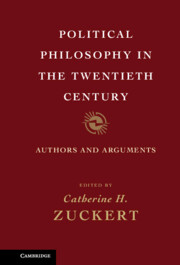Book contents
- Frontmatter
- Contents
- Contributors
- Introduction: political philosophy in the twentieth century
- Part I The three basic alternatives in the early twentieth century
- 1 John Dewey: philosophy as theory of education
- 2 Carl Schmitt: political theology and the concept of the political
- 3 Antonio Gramsci: liberation begins with critical thinking
- Part II ??migr?? responses to World War II
- Part III The revival of liberal political philosophy
- Part IV Critiques of liberalism
- Index
- References
3 - Antonio Gramsci: liberation begins with critical thinking
Published online by Cambridge University Press: 05 June 2012
- Frontmatter
- Contents
- Contributors
- Introduction: political philosophy in the twentieth century
- Part I The three basic alternatives in the early twentieth century
- 1 John Dewey: philosophy as theory of education
- 2 Carl Schmitt: political theology and the concept of the political
- 3 Antonio Gramsci: liberation begins with critical thinking
- Part II ??migr?? responses to World War II
- Part III The revival of liberal political philosophy
- Part IV Critiques of liberalism
- Index
- References
Summary
Antonio Gramsci (1891–1937) had been dead for a decade and absent from the political scene for twice that long when his letters from prison were published in Italy for the first time in 1947. Widely reviewed and highly acclaimed, the volume was declared a major literary work and awarded the prestigious Viareggio Prize. Largely unknown or forgotten outside communist circles, Gramsci burst onto the national scene posthumously in the immediate aftermath of the Fascist catastrophe, just when the country was most in need of narratives of heroic resistance to the dictatorship to assuage or attenuate its collective guilt and shame. The Letters from Prison, however, did more than document the sufferings borne with dignity by a political dissident who described himself as “an average man who has his own convictions and will not trade them away for anything in the world.” In his correspondence, Gramsci often discussed at considerable length the studies he was conducting in his prison cell, as well as the ideas and critiques he was elaborating in his notebooks. One could see from his letters that the prisoner had managed to defy the Fascist prosecutor's determination to “prevent this brain from functioning for twenty years.” What the Fascists feared most in Gramsci was his intellect, perversely mirroring his view that, in politics, ideas matter at least as much as the direct exercise of power and frontal opposition to it. Although unable to put a stop to Gramsci's intellectual labor, the regime nevertheless succeeded in keeping it hidden for the twenty years that followed his arrest. Once the letters were published, it was Gramsci's intellectual legacy that attracted the greatest attention. Benedetto Croce, who had long been regarded as Italy's preeminent philosopher and intellectual arbiter – and aptly labeled “a kind of lay pope” in one of the letters – declared in an enthusiastic review of the volume that “as a thinker [Gramsci] was one of us, of those who in the early decades of the century applied themselves to the task of developing in Italy a philosophical and historical mode of thinking adequate to the problems of the present; I, too, was among them in the role of an elder vis-à-vis the younger ones.”
Keywords
- Type
- Chapter
- Information
- Political Philosophy in the Twentieth CenturyAuthors and Arguments, pp. 44 - 58Publisher: Cambridge University PressPrint publication year: 2011
References
- 2
- Cited by



